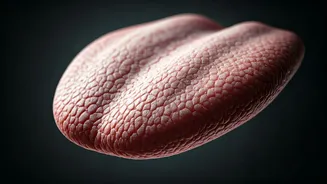What is Dry Mouth?
Dry mouth, or xerostomia, occurs when the salivary glands don't produce enough saliva to keep the mouth moist. Saliva is vital for oral health, aiding
in digestion, fighting bacteria, and preventing tooth decay. The causes of dry mouth are diverse, ranging from medications and medical conditions to lifestyle factors. Dry mouth can significantly impact a person's quality of life. Understanding the condition and its underlying causes is essential to managing the symptoms effectively. Dry mouth can make it difficult to swallow, speak, and even taste food. Therefore, it is important to know about its causes, symptoms and remedies.
Common Symptoms Noticed
The symptoms of dry mouth are varied and can affect daily life. A primary indicator is a persistent feeling of dryness in the mouth. Other signs include difficulty swallowing or speaking, which can lead to discomfort during meals and conversations. The tongue may feel rough or dry, and there may be a burning sensation in the mouth or on the tongue. In addition, the sense of taste can be altered or lost. More severe cases can result in increased instances of mouth sores, cracked lips, and even infections due to reduced saliva's protective properties. Recognizing these symptoms helps individuals seek timely intervention and treatment.
Factors Behind Dryness
Several factors contribute to the development of dry mouth. One of the leading causes is the side effects of medications. Many commonly prescribed drugs, including antihistamines, antidepressants, and high blood pressure medications, can reduce saliva production. Various medical conditions such as Sjogren's syndrome, diabetes, and HIV/AIDS are also associated with dry mouth. In addition, lifestyle choices such as smoking, excessive alcohol consumption, and dehydration can worsen or trigger the condition. Radiation therapy to the head and neck can damage salivary glands, resulting in a decline in saliva production. Identifying the cause of dry mouth is critical for appropriate management.
Effective Treatment Options
Effective management of dry mouth focuses on addressing the symptoms and addressing the root causes where possible. Staying hydrated by drinking plenty of water throughout the day is crucial. Over-the-counter saliva substitutes and moisturizing mouthwashes can provide temporary relief and keep the mouth moist. Sucking on sugar-free candies or chewing sugar-free gum can stimulate saliva production. Medical treatments may include medications to stimulate saliva flow, such as pilocarpine or cevimeline, prescribed by a doctor. Avoiding substances that dry out the mouth, such as caffeine and alcohol, can also help alleviate the symptoms. Regular dental check-ups are also essential to monitor and manage oral health complications.
Preventative Measures to Apply
Preventing dry mouth involves adopting lifestyle changes and addressing underlying causes. Regular dental hygiene practices, including brushing and flossing, are essential. Reviewing medications with a healthcare provider can help identify and, if possible, switch to medications with fewer side effects. Individuals should avoid smoking and limit alcohol consumption to minimize its drying effects. Furthermore, using a humidifier, especially at night, can increase moisture levels and provide relief. Routine dental check-ups are vital for monitoring oral health and catching any issues early. These measures, combined with proactive symptom management, are crucial for minimizing dry mouth and maintaining oral health.





















